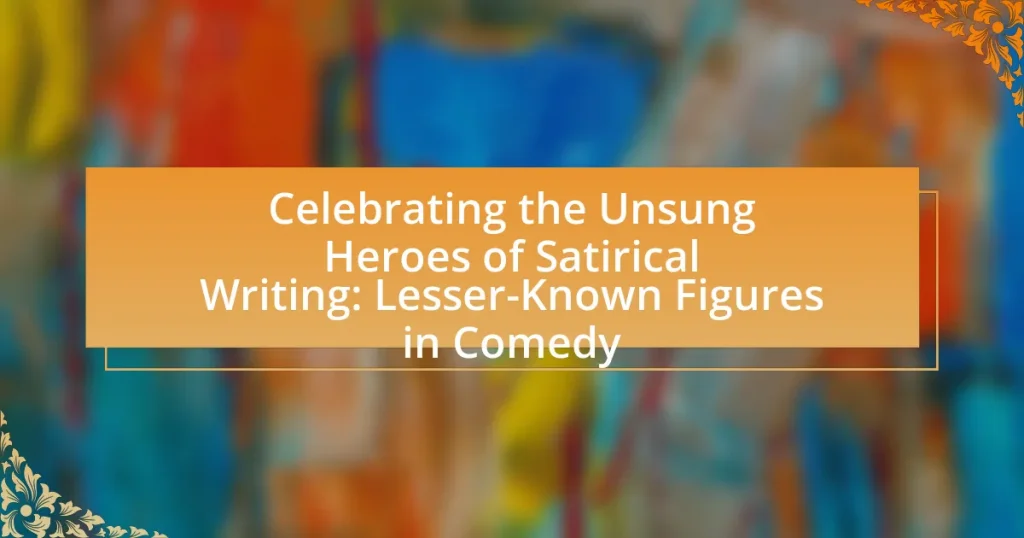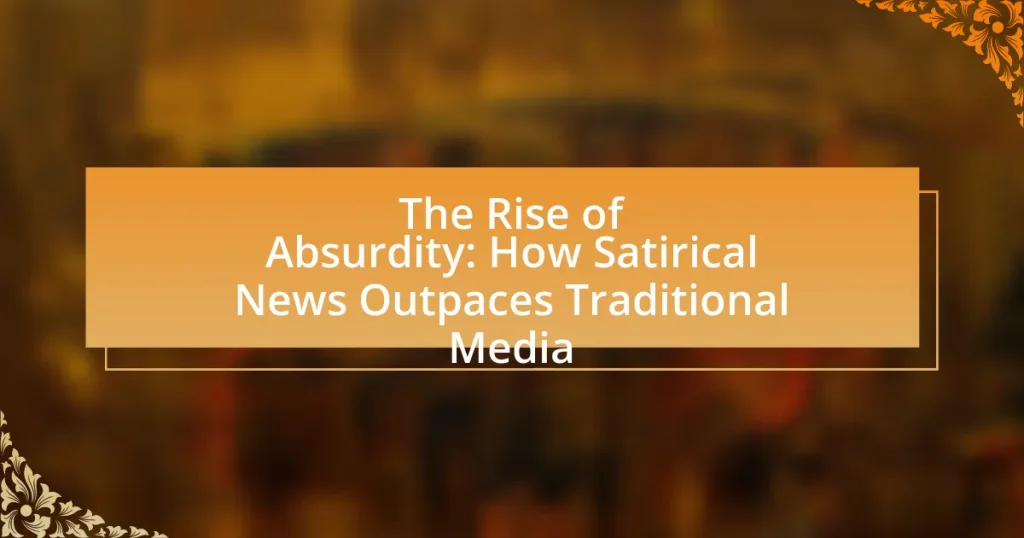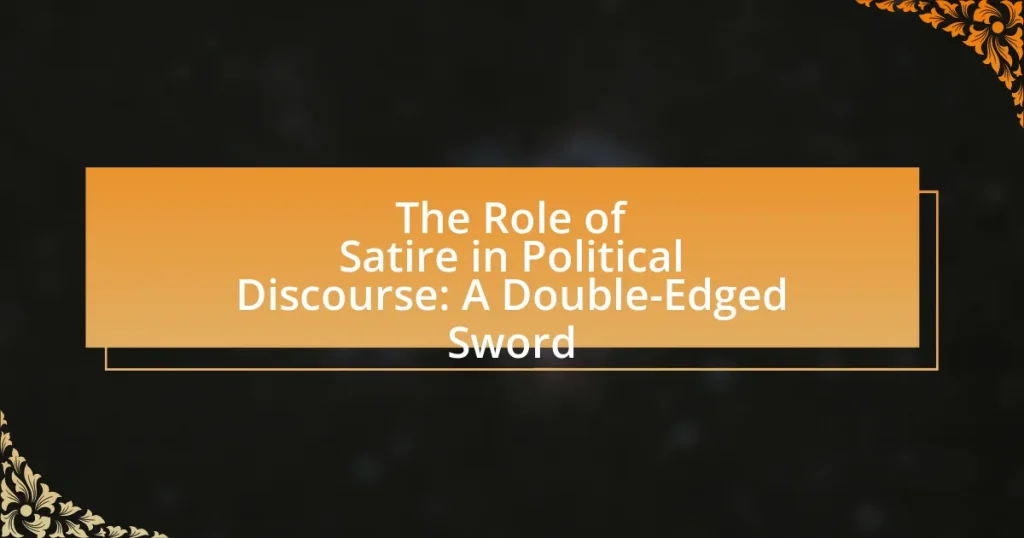The article focuses on the unsung heroes of satirical writing, highlighting lesser-known figures who have made significant contributions to the genre. It examines the defining characteristics of these writers, such as their unique perspectives and innovative techniques, which often differ from mainstream satirists. The piece emphasizes the importance of recognizing these individuals for their impact on comedy and social commentary, exploring themes they commonly address, including social justice and absurdity. Additionally, it provides insights on how to discover and appreciate their work, as well as the role of personal experience in shaping their comedic voice.

Who are the Unsung Heroes of Satirical Writing?
The unsung heroes of satirical writing include figures like Jonathan Swift, who, while well-known for “A Modest Proposal,” often overshadowed lesser-known contemporaries such as John Arbuthnot, whose works critiqued society through humor. Additionally, writers like Ambrose Bierce, known for “The Devil’s Dictionary,” and Dorothy Parker, whose sharp wit in her essays and poetry provided social commentary, also exemplify this category. Their contributions, though not always celebrated, have significantly shaped the landscape of satire by addressing social issues and human follies with incisive humor.
What defines an unsung hero in the context of comedy?
An unsung hero in the context of comedy is a comedian or writer whose contributions significantly impact the genre but remain largely unrecognized by the mainstream audience. These individuals often influence popular comedians and shape comedic styles without receiving the accolades or visibility they deserve. For example, figures like Phyllis Diller and Bob Newhart have been pivotal in developing comedic techniques and styles that later became mainstream, yet they often do not receive the same level of recognition as their more famous counterparts. Their work exemplifies the foundational elements of comedy that inspire future generations, highlighting the importance of acknowledging those who have shaped the comedic landscape despite their lack of fame.
How do these figures differ from mainstream satirists?
These figures differ from mainstream satirists primarily in their unique approaches and themes, often focusing on niche subjects or local issues that mainstream satirists may overlook. For instance, lesser-known satirists frequently employ a more personal or grassroots style, allowing them to connect deeply with specific audiences, unlike mainstream satirists who typically address broader societal issues for mass appeal. This distinction is evident in the works of figures like Molly Ivins, who tackled Texas politics with a distinct regional flavor, contrasting with the national focus of mainstream satirists like Jon Stewart.
What impact do they have on the genre of satire?
Lesser-known figures in satirical writing significantly enrich the genre by introducing diverse perspectives and innovative techniques. Their unique voices challenge mainstream narratives, allowing for a broader exploration of societal issues. For instance, writers like Jonathan Swift and Mark Twain, though well-known, inspired many lesser-known contemporaries who utilized satire to critique social norms and politics, thereby expanding the genre’s scope. This impact is evident in the way these writers employ humor to provoke thought and encourage critical discourse, ultimately shaping the evolution of satire as a tool for social commentary.
Why is it important to celebrate lesser-known figures in comedy?
Celebrating lesser-known figures in comedy is important because it acknowledges diverse voices that contribute to the richness of the comedic landscape. These individuals often bring unique perspectives and styles that challenge mainstream narratives, fostering innovation within the genre. For instance, comedians like Moms Mabley and Richard Pryor, who were pivotal in shaping modern stand-up, initially faced obscurity despite their significant impact. Recognizing their contributions not only honors their legacy but also inspires future generations of comedians to explore varied forms of humor, ultimately enriching the art of comedy itself.
What contributions have these writers made to the field?
These writers have significantly contributed to the field of satirical writing by introducing unique perspectives and innovative styles that challenge societal norms and provoke thought. For instance, their works often employ humor to critique political systems, social injustices, and cultural absurdities, thereby engaging audiences in critical discourse. Notably, their ability to blend wit with poignant commentary has enriched the genre, allowing for a deeper exploration of complex issues. This impact is evidenced by the way their writings have inspired subsequent generations of satirists, fostering a vibrant landscape of comedic expression that continues to evolve.
How does recognizing them enrich our understanding of satire?
Recognizing lesser-known figures in satirical writing enriches our understanding of satire by highlighting diverse perspectives and techniques that contribute to the genre’s depth. These figures often challenge mainstream narratives, offering unique insights that broaden the scope of satire beyond well-known authors. For instance, the works of lesser-known satirists can reveal cultural nuances and social critiques that resonate with specific audiences, thereby enhancing the overall appreciation of satire as a multifaceted art form. This recognition allows for a more inclusive analysis of satire, acknowledging the contributions of various voices that have shaped its evolution throughout history.

What are the Characteristics of Lesser-Known Satirical Writers?
Lesser-known satirical writers often exhibit a unique blend of sharp wit, social commentary, and unconventional perspectives. These writers frequently challenge societal norms and conventions through humor, using irony and exaggeration to highlight absurdities in politics, culture, and human behavior. Their work may lack mainstream recognition, yet it often resonates deeply with niche audiences who appreciate nuanced critique and clever wordplay. For instance, writers like Ambrose Bierce and Dorothy Parker, though not as widely celebrated as their contemporaries, utilized satire to address serious issues, showcasing the power of humor as a tool for reflection and change.
How do their styles and techniques differ from well-known satirists?
Lesser-known satirists often employ more subtle and nuanced techniques compared to well-known satirists, who may rely on overt humor and broad caricatures. For instance, while prominent figures like Jonathan Swift or George Carlin utilize sharp, direct satire to critique societal norms, lesser-known satirists might focus on irony and understated wit, allowing their commentary to emerge gradually through character development or situational absurdity. This approach can create a more reflective experience for the audience, as seen in the works of satirists like A.P. Herbert, who often blended humor with poignant social commentary, contrasting with the more aggressive styles of their famous counterparts.
What unique perspectives do they bring to their work?
Lesser-known figures in satirical writing bring diverse cultural backgrounds and personal experiences that enrich their comedic narratives. These writers often challenge mainstream perspectives by incorporating unique social critiques, reflecting their distinct viewpoints on societal norms and issues. For instance, many of these satirists draw from their own marginalized experiences, allowing them to address topics like inequality and injustice with authenticity and depth. This approach not only broadens the scope of satire but also fosters a more inclusive dialogue within the comedic landscape, highlighting voices that are often overlooked in mainstream comedy.
How do their backgrounds influence their comedic voice?
Comedians’ backgrounds significantly influence their comedic voice by shaping their perspectives, experiences, and cultural references. For instance, a comedian raised in a multicultural environment may incorporate diverse cultural elements and humor styles, reflecting their unique upbringing. This is evident in the work of lesser-known figures in comedy, who often draw from personal narratives and societal observations rooted in their backgrounds, allowing them to connect with audiences on a deeper level. Research indicates that comedians who leverage their life experiences tend to create more relatable and impactful material, as their authenticity resonates with viewers.
What themes are commonly explored by these unsung heroes?
Unsung heroes in satirical writing commonly explore themes of social justice, absurdity in everyday life, and the critique of authority. These writers often use humor to highlight societal issues, such as inequality and corruption, making complex topics accessible to a broader audience. For instance, figures like Jonathan Swift and his work “A Modest Proposal” exemplify the use of satire to address serious social problems, illustrating the power of comedy to provoke thought and inspire change.
How do social and political issues shape their satire?
Social and political issues significantly shape satire by providing the context and material that satirists critique. Satirists often draw upon current events, societal norms, and political climates to highlight absurdities, injustices, or contradictions within those issues. For instance, during times of political unrest, satirical works may focus on government corruption or social inequality, using humor to provoke thought and inspire change. Historical examples include the works of Jonathan Swift, who critiqued British colonialism and social injustices in Ireland through his satirical writings. This connection between satire and social-political issues underscores the genre’s role as a mirror reflecting societal flaws and encouraging discourse.
What role does personal experience play in their writing?
Personal experience significantly influences the writing of lesser-known figures in satirical comedy by providing authentic perspectives and relatable content. These writers often draw from their own life events, cultural backgrounds, and societal observations, which enrich their narratives and humor. For instance, personal anecdotes can serve as a foundation for satire, allowing these authors to critique social norms and highlight absurdities in everyday life. This connection between personal experience and writing not only enhances the authenticity of their work but also resonates with audiences, making their satire more impactful and engaging.

How can we discover and appreciate these lesser-known figures?
To discover and appreciate lesser-known figures in satirical writing, one can explore niche literary anthologies and online archives that focus on underrepresented voices in comedy. These resources often compile works from authors who may not have received mainstream recognition, allowing readers to engage with their unique perspectives and styles. For instance, anthologies like “The New Yorker: The Complete Collection” include lesser-known contributors alongside famous writers, providing a broader context for their work. Additionally, attending local comedy shows or literary festivals can introduce audiences to emerging satirical writers, fostering appreciation through live performances and discussions.
What resources are available for exploring their work?
Resources available for exploring the work of lesser-known figures in satirical writing include academic journals, online databases, and dedicated literary websites. Academic journals such as “The Journal of Satire Studies” provide peer-reviewed articles that analyze the contributions of these writers. Online databases like JSTOR and Project MUSE offer access to a wide range of literary criticism and historical context related to satirical works. Additionally, websites such as the Satire Society and the Comedy Archive feature collections of essays, interviews, and bibliographies that highlight the achievements of these unsung heroes in comedy.
How can readers find hidden gems in satirical literature?
Readers can find hidden gems in satirical literature by exploring lesser-known authors and niche publications that focus on satire. Many acclaimed satirical works are overshadowed by mainstream titles, making it essential to seek out independent presses and literary journals that prioritize innovative voices. For instance, authors like Kurt Vonnegut and Joseph Heller gained recognition, but many contemporaries remain underappreciated. Engaging with online literary communities and forums can also lead to recommendations of overlooked satirical works, as readers share their discoveries and insights. Additionally, attending literary festivals or workshops dedicated to satire can expose readers to emerging talents and unique perspectives in the genre.
What platforms showcase the work of these writers?
Platforms that showcase the work of lesser-known satirical writers include online publications, social media, and literary journals. Websites like The Onion and McSweeney’s publish satirical content, while platforms such as Medium allow writers to share their comedic essays. Additionally, social media platforms like Twitter and Instagram enable these writers to reach audiences directly through short-form content and visual satire. Literary journals often feature satirical pieces, providing a more traditional avenue for showcasing their work.
How can we support and promote unsung heroes in comedy?
To support and promote unsung heroes in comedy, we can create platforms that showcase their work, such as open mic nights, online streaming events, and social media campaigns. These initiatives provide visibility and recognition to lesser-known comedians, allowing them to reach wider audiences. For instance, organizations like the Comedy Coalition have successfully highlighted emerging talents through curated events, demonstrating that targeted efforts can elevate the profiles of these artists. Additionally, collaborating with established comedians to mentor and promote unsung heroes can further enhance their visibility and credibility in the industry.
What actions can readers take to elevate their voices?
Readers can elevate their voices by actively engaging with and sharing the works of lesser-known satirical writers. This can be achieved through social media platforms, book clubs, and community discussions, where readers highlight and promote these writers’ contributions to comedy. For instance, sharing quotes or excerpts from their works can spark conversations and increase visibility. Additionally, readers can write reviews or blog posts that analyze and celebrate the unique perspectives these writers offer, thereby amplifying their voices in the literary community. Engaging in these actions not only supports the writers but also enriches the readers’ understanding of satire and its impact on culture.
How can social media play a role in this promotion?
Social media can significantly enhance the promotion of lesser-known figures in satirical writing by providing a platform for wider audience engagement and content sharing. Through targeted campaigns, social media allows for the dissemination of their work, enabling users to discover and appreciate their contributions to comedy. For instance, platforms like Twitter and Instagram facilitate the sharing of quotes, clips, and discussions, which can lead to increased visibility and interest. According to a study by the Pew Research Center, 69% of adults in the U.S. use social media, indicating a vast potential audience for promoting these unsung heroes.
What are some practical tips for engaging with lesser-known satirical writing?
To engage with lesser-known satirical writing, readers should actively seek out diverse sources, such as independent publications, online platforms, and niche blogs that focus on satire. Exploring these avenues allows individuals to discover unique voices and perspectives that may not be represented in mainstream media. Additionally, participating in discussions on social media or forums dedicated to satire can enhance understanding and appreciation of the nuances in lesser-known works. Engaging with the authors through comments or direct messages can also provide insights into their creative processes and intentions, fostering a deeper connection to the material.



